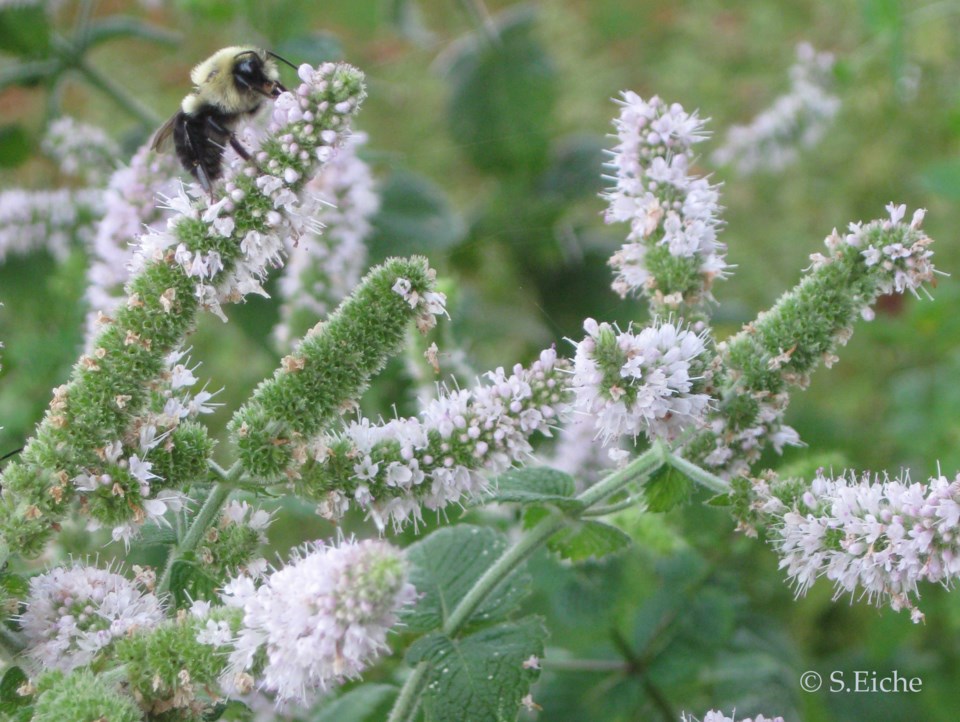The only things on a bee’s mind – if it has a mind – is making honey and pollinating plants. I have to admit that’s what I thought until I read the 2014 novel The Bees by Laline Paul (available in Richmond Public Library), which one reviewer described as “a well-researched fantasy about animals, starring a feisty heroine.” Paul’s book made me regard bees in a different way.
In garden beds in the front and back yards I’d planted my mother’s favourite flowers – snapdragons – to honour her. I’d also planted lots of herbs, not so much because I was thinking of bees and other beneficial insects, but because I was intrigued by the idea of a cultivating a medieval herb garden. My attitude changed dramatically once I’d switched my focus from anthropocentric-egocentric to biocentric-ecocentric.
The bee colony collapse disorder was first reported in 2006, but it took me a while to grasp the consequences. Scientists determined various causes: the invasive varroa mite; stress due to industrialized agriculture and to long-haul transportation of hives for pollination; habitat change and loss, leading to inadequate forage; pesticide poisoning.
Pesticide use has increased by 80 per cent in the last 30 years. Biodiversity has suffered as a result. It has also suffered because of herbicides such as glyphosate, on the market since the 1980s. Glyphosate kills wildflowers.
The pesticides we hear about most often in the news today are neonicotinoids, used in agriculture. They were developed in the 1980s by scientists at Shell and Bayer. The toxic chemicals in neonicotinoids are water soluble and enter the ground and waterways. The European Union’s high court banned them outright in January 2023. In the U.S., the Environmental Protection Agency permits the use of imidacloprid, thiamethoxam, clothianidin and dinotefuran on farmland. Canada approved use of the first three in June 2021.
Neonicotinoids are blamed for widespread declines in insect populations. They have been found to affect the immune system of bees and cause them to become disorientated, unable to find their way back to the hive. The newer sulfoximine insecticides also attack insect nervous systems.
Within the last eight months, two scientists – Lars Chittka, professor in the School of Biological and Behavioural Sciences at Queen Mary University of London, and Stephen Buchmann, adjunct professor in the Departments of Entomology and Ecology & Evolutionary Biology at the University of Arizona – have each brought out a book presenting bees as sentient creatures. Chittka’s The Mind of a Bee was published July 26, 2022 (available at Richmond Public Library), and Buchmann’s What a Bee Knows: Exploring the Thoughts, Memories and Personalities of Bees, appeared March 7, 2023.
Buchmann’s book builds on Chittka’s research, allowing him “to paint a remarkable picture of bee behaviour and psychology. It argues that bees can demonstrate sophisticated emotions resembling optimism, frustration, playfulness and fear, traits more commonly associated with mammals. Experiments have shown bees can experience PTSD-like symptoms, recognize different human faces, process long-term memories while sleeping, and maybe even dream.”
The revelations of Chittka and Buchmann will hopefully spread far and fast and influence not only how bees are treated in scientific experiments in laboratories but also how they are considered by the US Department of Agriculture and the Environmental Protection Agency, and by the corresponding agencies in other countries. Moreover, it’s to be hoped that more of us ordinary, private citizens will look at bees in a new light and do all we can to welcome them, starting with planting the kinds of wildflowers that sustain them. Herbs, for example, especially those in the mint family, bloom with many, tiny florets, which are perfect for pollinators such as bees (as well as hummingbirds).
We depend on bees. Bees need our help. Not taking care of bees is like building our house without a foundation – it won’t last long before it sinks or falls apart, and we suffer a similar fate.
Sabine Eiche is a local writer and art historian with a PhD from Princeton University. She is passionately involved in preserving the environment and protecting nature. Her columns deal with a broad range of topics and often include the history (etymology) of words in order to shed extra light on the subject.



